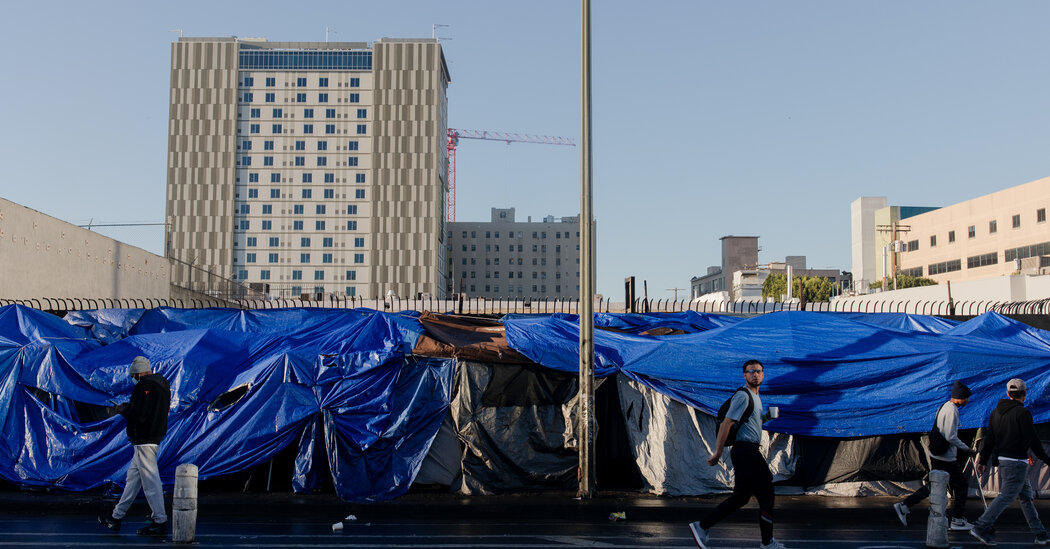There is a homelessness problem in California and drugs/mental illness do contribute to it, but the much bigger issue is the price of housing and California’s stubborn unwillingness to build more of it to meet demand. There is a spectrum of homelessness in California and it ranges from people sleeping on the street to people living in RVs because they can’t afford to rent an apartment. RVs are literally everywhere in some parts of the state, which really adds to the dystopian vibe. Some cities have cracked down on them, which I agree, no one wants an RV parked in front of their house with someone just living there, but it’s not the main fix. The problem is created in the first place because someone needs a house and doesn’t have one.
So, I feel similarly about Newsom’s bill here. There should be mechanisms to usher addicts into programs to help them get clean and mentally ill folks into programs to support them, but it’s not the main fix.
If anything this program will help clean up California’s image problem, but it’s not going to address the root cause.
We’ll see how it works out, I guess. I voted against it, personally, because it adds a bunch of extra responsibilities to existing programs without any extra long-term funding to go along with it. I’m concerned that stretching limited resources even thinner may not be the best strategy.
Funny that Newsom pushed the bill but the majority of Yes voters were Republicans that hate the homeless. Ugh. This is what happens when centrist corporate politicians are in charge.
‘Everyone is terrified of King Gavin’: Newsom’s unchallenged anti-homelessness gambit
The governor has repackaged his mental health ballot measure to make it more appealing to voters amid a budget crunch. Here’s why no one is trying to stop him.
https://www.politico.com/news/2024/03/02/prop-1-ballot-measure-mental-health-battle-00144530
From the article summary in this same thread:
“polls showed Republicans overwhelmingly opposed Proposition 1.”
A YES vote on this measure means: Counties would need to change some of the mental health care and drug or alcohol treatment services provided currently to focus more on housing and personalized support services. The state could borrow up to $6.4 billion to build (1) more places where people could get mental health care and drug or alcohol treatment and (2) more housing for people with mental health, drug, or alcohol challenges.
A NO vote on this measure means: Counties would not need to change the mental health care and drug or alcohol treatment services provided currently. The state could not borrow up to $6.4 billion to build more places where people could get mental health care and drug or alcohol treatment and more housing for people with mental health, drug, or alcohol challenges.
I’m confused as to how you arrived at your conclusion. Can you clarify?
The lopsided contest gives the politically ambitious governor a clear path to a potential landslide victory that includes significant Republican support when the measure appears on the March 5 ballot.
Ads from the ballot measure committee controlled by Newsom showcase law enforcement officials rather than doctors or therapists in what committee officials describe as an effort to win over right-leaning voters typically wary of the Democratic governor.
“Police speak to a certain segment of the electorate more than others, and showing that they’re part of your coalition I think shows the breadth of support,” explained committee spokesperson Anthony York. “We’re trying to speak to a broader audience, and maybe some of the Blue Lives Matter [supporters] as well will be inclined to support.”
https://www.politico.com/news/2024/03/02/prop-1-ballot-measure-mental-health-battle-00144530
Your citation for how Republicans voted is an article written before the vote.
As you respond to an article written after the vote that says they didn’t do that?
I feel like since posturing for a future federal office Newsom has been embracing his most rightward tendencies much more frequently.
This is the best summary I could come up with:
A key piece of California’s strategy to address its homelessness crisis was narrowly approved by voters in the state, The Associated Press determined on Wednesday, in a stunningly close margin that had Democrats on edge for more than two weeks.
But primary elections typically draw a more conservative electorate with fewer voters, especially when there isn’t a competitive presidential or governor’s race at the top of the ticket, and polls showed Republicans overwhelmingly opposed Proposition 1.
A related theory was that the Democratic establishment nearly foiled itself by spending tens of millions of dollars on ads promoting Steve Garvey as the “too conservative” Republican candidate in the Senate primary to succeed the late Dianne Feinstein.
Moreover, he said, the campaign for Proposition 1, with more than $13.6 million worth of ads on television and online, was dominated not by mental health professionals or frustrated downtown business owners, but by Mr. Newsom, whose approval rating in California has fallen below 50 percent for the first time in almost five years.
Proposition 1 will further expand that program, financing about 11,000 treatment beds and housing units with health care and social services for homeless people with mental illnesses and addiction.
State records show that Proposition 1 collected more than $15.7 million, with a donor list that included a Bay Area tribe, labor unions, builders, health care providers, Uber and the California Chamber of Commerce.
The original article contains 1,376 words, the summary contains 232 words. Saved 83%. I’m a bot and I’m open source!



